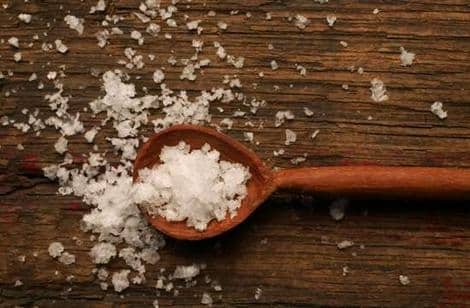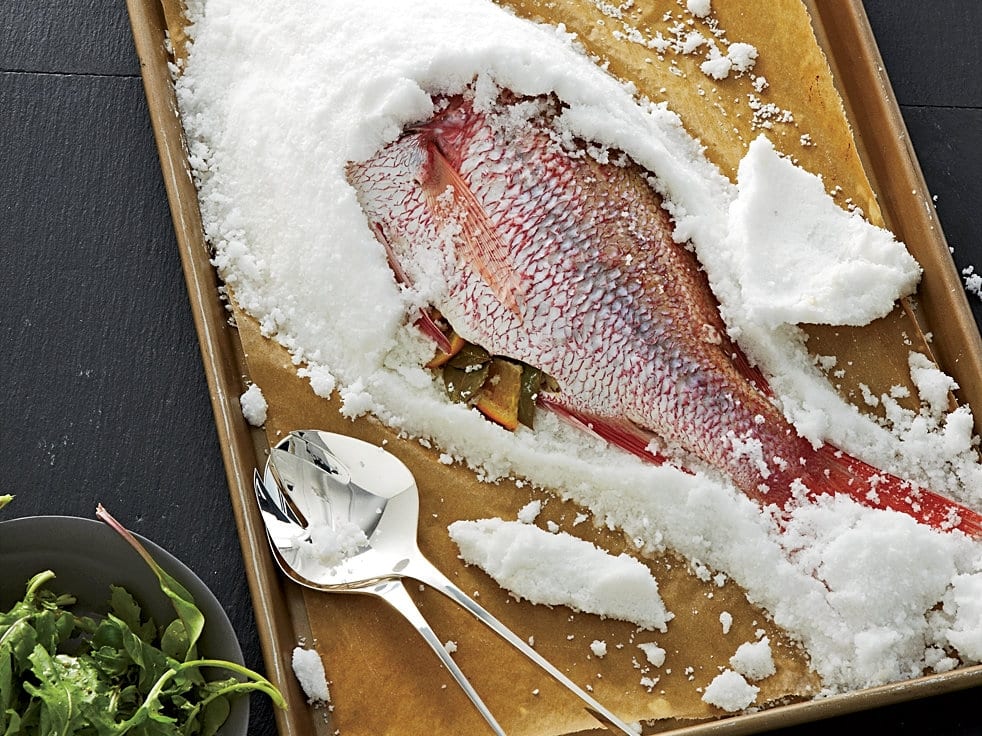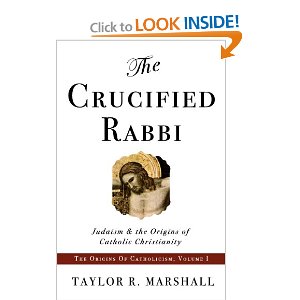Why does Holy Water have salt in it? Elisha, Jesus, and Salted Fish
Why does holy water have salt in it? In the East and the West, salt has always been added to the making of holy water.

Before 1964, the Rituale Romanum includes an exorcism of the water and the adding of exorcized salt to the making of holy water. Here is the pre-1964 exorcism of the water:
O water, creature of God, I exorcise you in the name of God the Father almighty, and in the name of Jesus Christ His Son, our Lord, and in the power of the Holy Spirit. I exorcise you so that you may put to flight all the power of the Enemy, and be able to root out and supplant that Enemy with his apostate angels: through the power of our Lord Jesus Christ, Who will come to judge the living and the dead and the world by fire. Amen.
Almighty and everlasting God, we humbly implore Thee, in Thy immeasurable kindness and love, to bless + and sanctify + this salt which Thou did create and give over to the use of mankind, so that it may become a source of health for the minds and bodies of all who make use of it, and may rid whatever it touches or sprinkles of all uncleanness and protect it from every assault of evil spirits. Through our Lord, Jesus Christ, Thy Son, Who lives and reigns with Thee in the unity of the Holy Spirit, God, for ever and ever. R. Amen.
After 1964, the new Rituale Romanum excludes both the exorcism and the salt. (Not a fantastic development in my non-magisterial layman’s opinion.)

Providentially, Summorum Pontificum by Pope Benedict XVI allows all priests to use the pre-1964 formula for making holy water – and many priests quietly do this.
So why salt?
The Levitical priesthood under Moses identifies salt with “covenant”:
“Every offering of your grain offering you shall season with salt; you shall not allow the salt of the covenant of your God to be lacking from your grain offering. With all your offerings you shall offer salt.” (Lev 2:13)
We find it again in Numbers:
All the holy offerings which the people of Israel present to the Lord I give to you, and to your sons and daughters with you, as a perpetual due; it is a covenant of salt for ever before the Lord for you and for your offspring with you.” (Num 18:19)
And the Davidic Messianic Covenant is a “covenant of salt” (2 Chronicles 13:5).
Since all Catholic liturgical forms come from Israelite liturgical forms, we can expect salt to play an important role in our sacramental life.
Moreover, the waters over which the Spirit hovered in Genesis 1 were salty (Covenant of Creation). The Flood of Noah was salty (Covenant of Noah). The Red Sea was salty (Covenant of Moses). It also refers to the action of Elishah the Prophet:
It also refers to the action of Elishah the Prophet:
19 Now the men of the city said to Elisha, “Behold, the situation of this city is pleasant, as my lord sees; but the water is bad, and the land is unfruitful.” 20 He said, “Bring me a new bowl, and put salt in it.” So they brought it to him. 21 Then he went to the spring of water and threw salt in it, and said, “Thus says the Lord, I have made this water wholesome; henceforth neither death nor miscarriage shall come from it.” 22 So the water has been wholesome to this day, according to the word which Elisha spoke.
Elisha uses something sterile (salt) to make other things unsterile (women’s wombs). This is polarity miracle. We see the same with Elijah before him. Elijah pours water on a sacrifice and it burns anyway. The effect of a thing is opposite its purpose and creates a miraculous outcome.
Salt placed in the mouth of the Baptized:
The fifth canon of the Third Council of Carthage (AD 397) states that Catechumens should repeatedly consumed holy salt as they prepared for baptism. Saint Augustine refers to himself having been made a “catechumen” at birth (Patristic baby dedication) but not having been baptized:
Even as a boy I had heard of eternal life promised to us through the humility of the Lord our God condescending to our pride, and I was signed with the sign of the cross, and was seasoned with His salt even from the womb of my mother, who greatly trusted in You. Confessions 1, 14.
Prior to Vatican II, the priest placed a touch of holy salt into the mouth of all the newly baptized (including infants).
Priest: N., Receive the salt of wisdom; let it be propitiation for you unto eternal life.
Sponsor/Catechumen: Amen.
Priest: Peace be with you.
Sponsor/Catechumen: And with your spirit.
Priest: Let us pray: O God of our fathers, O God the Author of all truth, vouchsafe, we humbly beseech Thee, to look graciously down upon this Thy servant, N., and as he (she) tastes this first nutriment of salt, allow him (her) no longer to hunger for lack of heavenly food, to the end that he (she) may be always fervent in spirit, rejoicing in hope, always serving Thy name. Lead him (her), O Lord, we beseech Thee, to the laver of the new regeneration, that, together with Thy faithful, he may deserve to attain the everlasting rewards of Thy promises. Through Christ our Lord. Amen.
Here’s a video of one of my children being baptized with the 1962 ritual of baptism. You can see the blessing and administration of holy salt at about 0:50:
This salt is given to whet the catechumens appetite for the Eucharist. It further demonstrates that everyone in the Roman Rite received the Eucharist after baptism – including infants well into the 5th century. Saint Cyprian and Saint Augustine refer matter-of-factly to infants receiving the Eucharist. Christian parents should fight for this Apostolic practice to be returned to the Roman Rite.
[bctt tweet=”Saint Cyprian and Saint Augustine refer matter-of-factly to infants receiving the Eucharist. Christian parents should fight for this Apostolic practice to be returned to the Roman Rite.” username=”@taylorrmarshall”]
If a Catholic altar is disturbed or desecrated (as this one was desecrated in Ireland), it must be reconsecrated but this time with holy salt to purify and cleanse it from the demonic.
Theology of Salt from the words of our Lord Jesus Christ:
Our Lord Jesus Christ also states: “For every one will be salted with fire.” (Mark 9:49) Why is this? We are all to be holocaust sacrifices to the Father through Jesus Christ. In the next verse, he states: “Have salt in yourselves, and be at peace one with another” (Mark 9:50). (Which is why the subtitle of this blog is “Stay salty my friends.”)
Christ says that all will be salted with fire. Every human will experience this salt as we pass through death. It is the judgment of Christ over our lives. Note that this means that Jesus the High Priest will treat everyone person as an animal sacrifice as in the Old Testament. Blood also is salty. Jewish texts also state that the one of the jobs of the Levites was to cast salt everywhere on the ground of the altar area so that the priests would not slip on all the sacrificial blood.
We have two models of salt and final judgment:
- The first is that of the salt of damnation. Salt is sterile. Lot’s wife “turned back” and turned into a pillar (statue) of salt. She is grouped with the valley of Sodom and Gomorrah (sterile sexual immorality), which now lies condemned beneath the Dead Sea (a salty body of water).

- The second is that of the salt of salvation. Salt preserves. The fisherman Apostles daily dealt in salt. There was no refrigeration and fish were always transported in salt. Fishermen needed boats, nets, and lots and lots of salt to be successful merchants.
 As Apostles (and their successors) are “fishers of men” it’s not enough to merely catch men. The fish of Jesus must be confirmed in grace and preserved by the “salt of the covenant.” Hence, salt becomes a sign against contagion and corruption. It’s a sign of orthodox preaching, teaching, and sacramental integrity within the Catholic Church.
As Apostles (and their successors) are “fishers of men” it’s not enough to merely catch men. The fish of Jesus must be confirmed in grace and preserved by the “salt of the covenant.” Hence, salt becomes a sign against contagion and corruption. It’s a sign of orthodox preaching, teaching, and sacramental integrity within the Catholic Church.
[bctt tweet=”As Apostles (and their successors) are fishers of men it’s not enough to merely catch men. The fish of Jesus must be confirmed in grace and preserved by the salt of the covenant.Hence, salt becomes a sign against contagion and corruption.” username=”@taylorrmarshall”]
[reminder]If you found this helpful, please share it on Facebook.[/reminder]
PS: If you want to discover more about Old Testament rites and their relationship to Catholic liturgy, check out this book: The Crucified Rabbi.
What to Watch Next
SHOP THE TAYLOR MARSHALL STORE
Dive Deeper

GET CONFIDENT IN YOUR FAITH
Explore the fascinating world of Catholic teachings with Dr. Marshall. Together you’ll unpack the brilliant answers the Church gives to tough questions about the Faith. The best part: you go at your own pace. Start this exciting journey today.


 >
>



